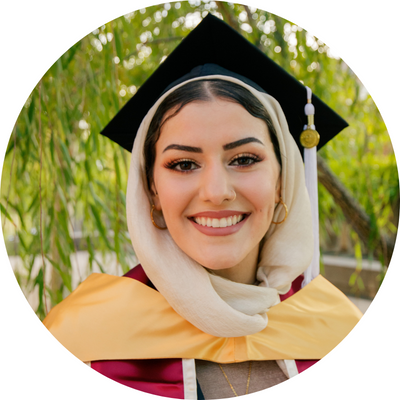
 When Noor Kahbi, a University of Oklahoma senior, read the job description of the William Randolph Hearst Fellowship at the Aspen Institute, she thought she’d found a gold mine. “It had all of my interests and it was hands-on experience at a major nonprofit,” she says. It also was a chance to apply all that she’d learned blazing a bright trail across the nonprofit world in her home state.
When Noor Kahbi, a University of Oklahoma senior, read the job description of the William Randolph Hearst Fellowship at the Aspen Institute, she thought she’d found a gold mine. “It had all of my interests and it was hands-on experience at a major nonprofit,” she says. It also was a chance to apply all that she’d learned blazing a bright trail across the nonprofit world in her home state.
Kahbi’s passion for nonprofits sparked after taking part in the Oklahoma Center for Community and Justice’s youth interfaith program. She visited faith centers to learn about and understand diverse religions with fellow students. “For me, a visibly Muslim woman growing up in Oklahoma, the acceptance and exposure that the program created was pivotal,” she says. The center’s mission and programming inspired her to explore the sector.
What’s followed is a wave of experiences that turned up the volume of young, strong, diverse voices in nonprofits. In high school, Kahbi helped students join boards as advisors through the Youth Philanthropy Initiative of Tulsa. The Oklahoma Group, a student-led organization at her university, gave Kahbi her first consulting experience as a strategic planner for a philharmonic. She now mentors and advises new consultants as the group’s president.
Kahbi also creates opportunities for peers in her public and nonprofit administration major to grow their skills. In 2021, she co-founded the Grant Writers Association of Oklahoma. Entry-level nonprofit jobs can require grant writing experience — and opportunities to gain it in college are few. The association closes that gap by connecting students to write grant proposals for nonprofits. As director of diversity, equity, and inclusion, Kahbi ensures equitable nonprofit and student recruitment. She reviews proposals for inclusive language that’s sensitive to the communities that nonprofit clients serve.
Now, as Hearst Fellow, Kahbi is helping PSI’s Nonprofit Data Collective urge the IRS to clear a backlog of unprocessed form 990s filed by nonprofits. “The data gap impacts funding and what donors think of an organization,” Kahbi says. “Trust in nonprofits is already an issue. Unreleased tax data worsens it.” She’s also helping survey the collective’s data users. The survey asks what nonprofit tax data users need. It also will inform one of PSI’s partners, Giving Tuesday, on how to build a user-friendly, accessible data platform.
Her fellowship’s given Kahbi insight into relationships among major nonprofits and how they’re working together toward a common goal. “It’s been a mind-expanding experience,” she says. “There’s a wide web of funding, service delivery, advocacy, lobbying, research, and policy. Everyone plays a unique role.”
Kahbi plans to move to Chicago to join a management consulting firm after she graduates in December 2022. She sees a master’s degree in her future — perhaps a doctorate. She’s open to career experiences with venture philanthropy or as a nonprofit program officer. “I care about leaving a positive impact on society. I love the way the nonprofit sector achieves that. It has a special place in my heart,” Kahbi says.
Spectrum: Stories of the Hearst Fellowship at PSI is a blog series that features current and past holders of the William Randolph Hearst Endowed Fellowship at the Program on Philanthropy & Social Innovation (PSI) at the Aspen Institute. The support of the Hearst Foundations makes possible this fellowship, which helps diversify and strengthen the social sector. PSI is grateful for the Hearst Foundations’ generous commitment.

